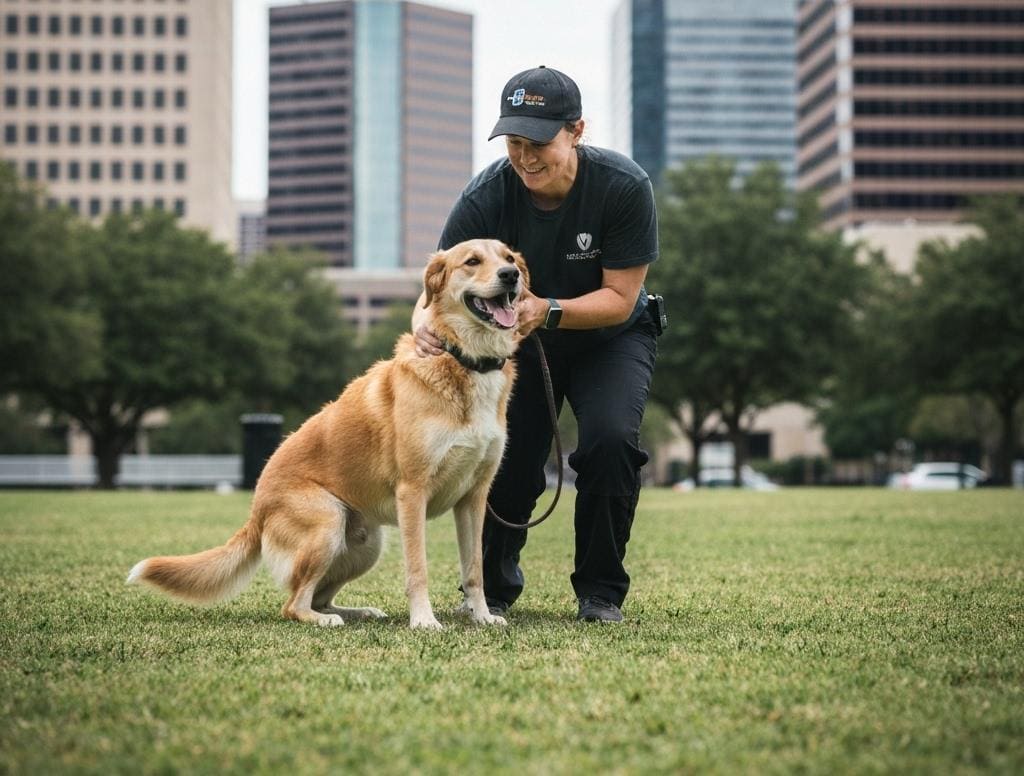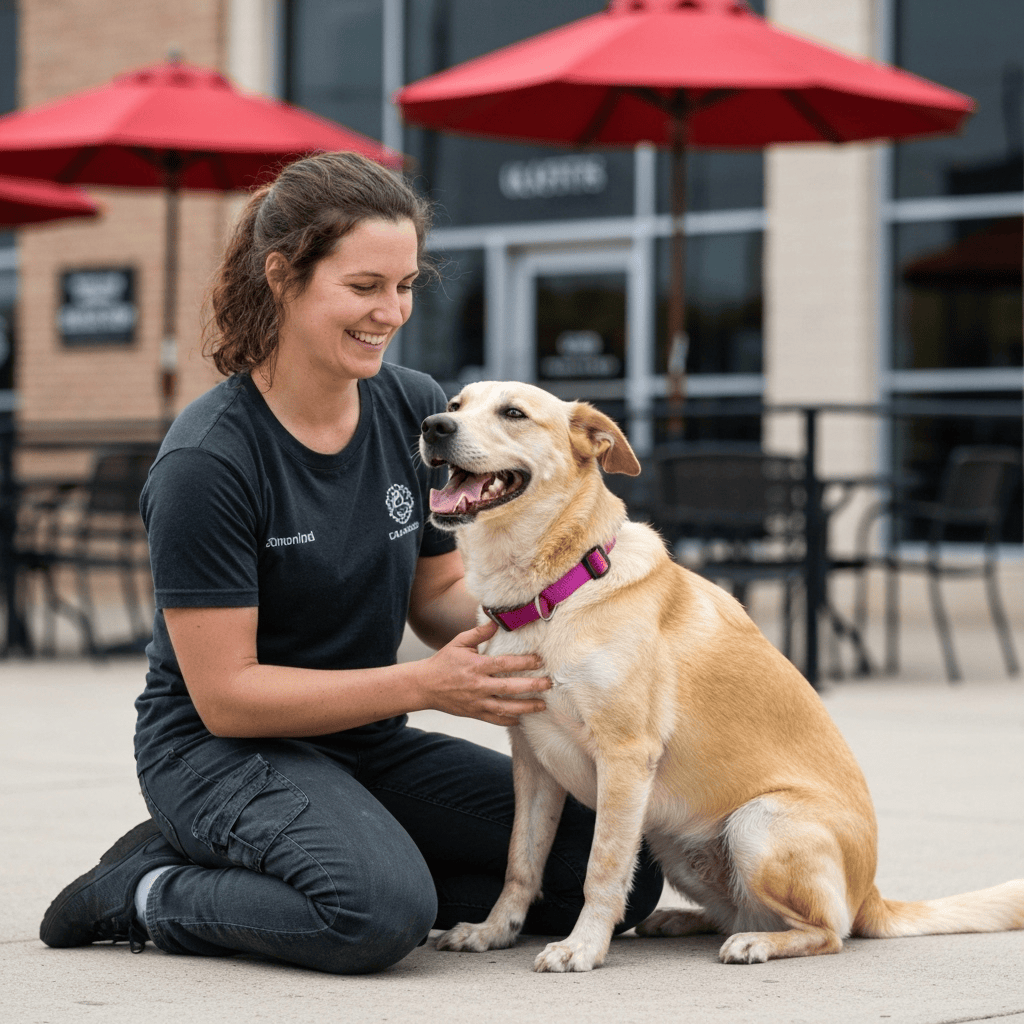Your Complete Guide to Choosing a Dog Trainer in Fort Worth
Fort Worth dogs live in a unique world. They navigate the busy sidewalks of West 7th, enjoy open trails along the Trinity River, and learn to be good neighbors in close-knit communities. That’s why training here needs to fit real Fort Worth life, not some cookie-cutter approach.
Finding the right trainer can feel overwhelming with so many options across the DFW area. This guide walks you through what really matters when choosing someone to help you and your dog succeed together.
How to Choose the Right Trainer
The best trainers understand that every dog is different. Your energetic Border Collie mix has different needs than your neighbor’s calm Golden Retriever. Look for someone who takes time to understand your specific situation before jumping into a training plan.
Positive reinforcement should be the foundation of any good training program. This means rewarding your dog for doing the right thing rather than punishing mistakes. Dogs learn faster and stay happier when training feels like a fun game rather than a scary test.
Ask about their education and ongoing learning. Many quality trainers hold credentials like dog trainer certifications, including KPA-CTP, CPDT-KA, CPDT-KSA, CBCC-KA, CTC, or IAABC-CDBC. While these aren’t required by law, they show a trainer cares enough to invest in learning proven methods.
You’ll also want someone who understands Fort Worth. A trainer who knows the local dog parks, busy areas where you’ll need good leash manners, and common challenges in our climate will be much more helpful than someone using generic advice.
Common Dog Training Methods That Actually Work

Good training should make sense to both you and your dog. Here are the methods that consistently get results without causing stress or fear.
Positive reinforcement forms the backbone of effective training. When your dog sits nicely instead of jumping on visitors, they get praise, treats, or play time. This builds confidence and makes your dog want to repeat good behavior.
Some dogs need help with specific fears or reactions. Desensitization and counter-conditioning are fancy terms for gradually helping your dog feel better about things that worry them. Maybe your dog gets anxious around other dogs at the park, or panics during thunderstorms. A skilled trainer can create a plan to change how your dog feels about these situations.
Management might sound boring, but it’s incredibly practical. Baby gates keep your puppy from chewing furniture while they learn house rules. A good leash prevents your dog from practicing bad habits like pulling toward every squirrel they see. Think of management as setting your dog up for success while training takes hold.
Some trainers offer day training or board and train programs where they work with your dog while you’re at work or away. These can jump-start progress, but make sure the trainer includes lessons for you too. The fanciest training in the world won’t stick if you don’t know how to maintain it at home.
What Training Costs in Fort Worth (2025 Prices)
Training prices vary quite a bit depending on the trainer’s experience, what’s included, and where you live in Tarrant County. Here’s what most Fort Worth area dog owners can expect to pay.
| Service Type | Average Cost (Fort Worth Area) |
|---|---|
| Group dog training classes, 4–6 weeks | $150 – $300 |
| Private training, 60–90 minutes | $100 – $185 per session |
| Puppy training package, 4–6 lessons | $325 – $650 total |
| Day training, 2–4 sessions per week | $450 – $950 per week |
| Board and train, 2–4 weeks | $1,900 – $4,500 total |
| Behavior consultation for fear or reactivity | $130 – $260 initial session |
Certified trainers and those with lots of experience typically charge more, but they often get results faster. If you live in outlying areas like Alliance, Benbrook, or far west Fort Worth, you might pay extra travel fees.
Don’t automatically choose the cheapest option. Training is an investment in years of good behavior and a stronger relationship with your dog. A skilled trainer who gets lasting results is worth more than someone cheap who leaves you with the same problems.
Fort Worth Laws Every Dog Owner Should Know

Understanding local rules helps you set clear training goals and keeps you out of trouble with neighbors and animal control.
Leash laws are strictly enforced in Fort Worth. Your dog needs to be on leash or properly contained at all times in public, except in designated off-leash areas. Learn more at the Fort Worth Animal Control Laws page.
Microchipping and ID tags aren’t just smart – they’re essential. Fort Worth Animal Care & Control strongly recommends microchips because they’re permanent identification that can’t fall off like a collar. Check out Fort Worth Animal Care & Control for local microchipping services.
Rabies vaccination is required by Texas law for all dogs. This isn’t optional, and you’ll need to show proof if your dog ever bites someone or gets picked up by animal control.
Barking and noise complaints can lead to fines and legal trouble. If your dog barks excessively, training can help address the root cause, whether it’s boredom, anxiety, or alerting behavior. This protects your relationship with neighbors too.
Questions to Ask Before Hiring a Trainer
Don’t be shy about asking detailed questions. A good trainer will welcome your questions and give you clear, honest answers.
- What training methods do you use, and how do you keep dogs comfortable during training?
- How will you customize training for my dog’s personality and my family’s lifestyle?
- What credentials or continuing education do you have?
- Do you offer private sessions, group classes, or both? What’s best for my situation?
- How do you measure progress, and when do we practice around distractions?
- What’s included in your price, and are there any extra fees I should know about?
- Do you carry liability insurance?
- If my dog has behavioral issues, do you work with veterinarians when needed?
- What will I need to practice between sessions?
Pay attention to how they answer these questions. Good trainers explain their methods clearly and never make you feel stupid for asking.
Local Resources for Fort Worth Dog Owners

Take advantage of these local spots and services to support your training efforts.
The city runs several dog parks where your dog can play off-leash once they have good recall skills. Find current rules and locations at Fort Worth Dog Parks.
Fort Woof Dog Park at Gateway Park offers separate areas for large and small dogs. It’s perfect for practicing recall and social skills in a controlled environment.
ZBonz Dog Park features swimming ponds and plenty of space. Once your dog has solid basic skills, this is a great place to practice around bigger distractions.
The Trinity Trails provide miles of walking paths perfect for leash training. You’ll encounter joggers, cyclists, and other dogs, making it ideal for real-world practice. Find trail maps and information at Trinity Trails.
Making Your Final Decision
Choose a trainer who prepares your dog for real Fort Worth life. This means teaching calm behavior around the crowds at Sundance Square, reliable leash manners on busy sidewalks, and good social skills at local dog parks.
Ask to see a sample training plan before you commit. The plan should include specific homework you can do at home, smart use of equipment like proper harnesses, and a clear path from basic skills to real-world practice.
If you’re interested in advanced goals like therapy dog work, make sure your trainer understands the process and uses methods that build confident, well-balanced dogs. The foundation starts with basic good manners and builds from there.
Frequently Asked Questions
Do I need a license for my dog in Fort Worth?
The city focuses on identification and vaccination rather than licensing. Make sure your dog has current rabies shots and consider microchipping for permanent ID.
Are leashes required everywhere in Fort Worth?
Yes, except in designated off-leash dog parks. Keep a sturdy 6-foot leash for sidewalks, trails, and regular city parks.
Are dog trainers licensed in Texas?
No special license is required for dog trainers in Texas or Tarrant County. Look for professional credentials and insurance instead.
What kind of insurance should my trainer have?
Responsible trainers carry general liability insurance to protect against accidents during training sessions.
Where can I safely practice around other dogs?
Start with quiet sections of the Trinity Trails when your dog is learning. Save the busy dog parks for after your dog has solid basic skills.
How long does dog training usually take?
Most dogs show improvement within a few weeks if owners practice consistently. Basic manners typically take 1-2 months, while behavior problems may need longer, more structured programs.
Can training help with barking complaints?
Absolutely. Trainers can address excessive barking caused by boredom, anxiety, or over-alerting. This keeps you in good standing with neighbors and the city.
What’s better – private training or group classes?
Private training offers personalized attention and can happen in your home. Group classes provide controlled socialization opportunities. Many dogs benefit from a combination of both.
Fort Worth offers an amazing lifestyle for dogs and their families. With the right trainer, a positive approach, and consistent practice around our city’s unique environment, your dog can become a confident, well-mannered companion ready for everything from neighborhood strolls to weekend adventures. The key is finding someone who understands both good training principles and what it’s really like to live here with a dog.
